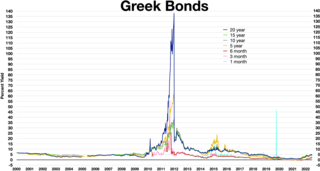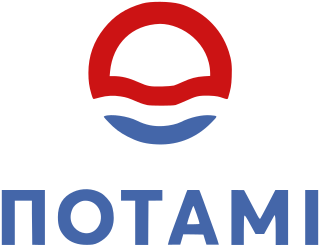
The Panhellenic Socialist Movement, known mostly by its acronym PASOK, is a social-democratic political party in Greece. Until 2012 it was one of the two major parties in the country, along with New Democracy, its main political rival. After a decade of poor electoral outcomes, PASOK has retained its position as one of the main Greek political parties and is currently the second largest party in the Greek Parliament.

The Coalition of the Radical Left – Progressive Alliance, best known by the syllabic abbreviation SYRIZA, is a centre-left to left-wing political party in Greece. It was founded in 2004 as a political coalition of left-wing and radical left parties, and registered as a political party in 2012.

The Third Hellenic Republic is the period in modern Greek history that stretches from 1974, with the fall of the Greek military junta and the final confirmation of the abolishment of the Greek monarchy, to the present day.

Alexis Tsipras is a Greek politician who served as Prime Minister of Greece from 2015 to 2019.

Parliamentary elections were held in Greece on Sunday, 6 May 2012 to elect all 300 members to the Hellenic Parliament. It was scheduled to be held in late 2013, four years after the previous election; however, an early election was stipulated in the coalition agreement of November 2011 which formed the Papademos Cabinet. The coalition comprised both of Greece's traditional major political parties, PASOK on the left and New Democracy (ND) on the right, as well as the right-wing Popular Orthodox Rally (LAOS). The aim of the coalition was to relieve the Greek government-debt crisis by ratifying and implementing decisions taken with other Eurozone countries and the International Monetary Fund (IMF) a month earlier.

Parliamentary elections were held in Greece on Sunday, 17 June 2012, to elect all 300 members to the Hellenic Parliament in accordance with the constitution, after all attempts to form a new government failed following the May elections. If all attempts to form a new government fail, the constitution directs the president to dissolve a newly elected parliament, and then to call for new parliamentary elections within 30 days of the dissolution. The president announced at 16 May the date for the new election, and signed the formal decree to dissolve the parliament and call for the election at 19 May.
The Greek government formation of May 2012 was a series of failed attempts to form a new government after the legislative election in May 2012 by the three largest parties: New Democracy (centre-right), Coalition of the Radical Left and Panhellenic Socialist Movement, respectively, and then followed by the President of Greece. After the negotiations led by the president had failed on 15 May, a temporary caretaker cabinet under Council of State president Panagiotis Pikrammenos was appointed on 16 May, and a new election was set for 17 June.
A Greek withdrawal from the eurozone was a hypothetical scenario, debated mostly in the early to mid 2010s, under which Greece would withdraw from the Eurozone to deal with the Greek government-debt crisis of the time. This conjecture was given the nickname "Grexit", a portmanteau combining the English words 'Greek' and 'exit', and which has been expressed in Greek as ellexodos. The term "Graccident" was coined for the case that Greece exited the EU and the euro unintentionally. These terms first came into use in 2012 and have been revitalised at each of the bailouts made available to Greece after that.

Parliamentary elections were held in Greece on Sunday 25 January 2015 to elect all 300 members of the Hellenic Parliament in accordance with the constitution. The election was held earlier than scheduled due to the failure of the Greek parliament to elect a new president on 29 December 2014.
European Parliament elections were held in Greece on 25 May 2014 to elect the 21 Greek members of the European Parliament. The number of seats allocated to Greece declined from 22 to 21, as a result of the 2013 reapportionment of seats in the European Parliament.

The Greek government-debt crisis began in 2009 and, as of November 2017, was still ongoing. During this period, many changes had occurred in Greece. The income of many Greeks has declined, levels of unemployment have increased, elections and resignations of politicians have altered the country's political landscape radically, the Greek parliament has passed many austerity bills, and protests have become common sights throughout the country.

The River was a centrist and social-liberal political party in Greece. The party was founded in February 2014 by Stavros Theodorakis. The party did not run in the 2019 elections and had no seats in the Hellenic Parliament.
The Third Economic Adjustment Programme for Greece, usually referred to as the third bailout package or the third memorandum, is a memorandum of understanding on financial assistance to the Hellenic Republic in order to cope with the Greek government-debt crisis.
This article details the fourteen austerity packages passed by the Government of Greece between 2010 and 2017. These austerity measures were a result of the Greek government-debt crisis and other economic factors. All of the legislation listed remains in force.

Euclid Stefanou Tsakalotos is a Greek economist and politician who was Minister of Finance of Greece from 2015 to 2019. He was also a member of the Central Committee of Syriza and has represented Athens B in the Hellenic Parliament since May 2012. He left Syriza in November 2023 and on 5 December 2023 he became founding member of New Left (Greece) parliamentary group.

A referendum to decide whether Greece should accept the bailout conditions in the country's government-debt crisis proposed jointly by the European Commission (EC), the International Monetary Fund (IMF) and the European Central Bank (ECB) on 25 June 2015 took place on 5 July 2015. The referendum was announced by Prime Minister Alexis Tsipras in the early morning of 27 June 2015 and ratified the following day by the Parliament and the President. It was the first referendum to be held since the republic referendum of 1974 and the only one in modern Greek history not to concern the form of government.

Popular Unity - Insubordinate Left is a left-wing political party in Greece.

The Second Cabinet of Alexis Tsipras was sworn in on 23 September 2015, following the Greek legislative election in September 2015. Alexis Tsipras, leader of Syriza, was sworn in as Prime Minister of Greece on 21 September, having agreed to re-form the coalition with Panos Kammenos and the Independent Greeks.

Course of Freedom is a Greek anti-establishment political party founded on 19 April 2016, by former President of the Hellenic Parliament, Zoe Konstantopoulou.
Socialism in Greece has a significant history, with various activists, politicians and political parties identifying as socialist. Socialist movements in Greece began to form around the early 20th century, including the Communist Party of Greece (KKE) (1920–present), the Socialist Party of Greece (1920-1953) and the Panhellenic Socialist Movement (PASOK). Socialist ideology is present in ΚΚΕ also known as the Communist party of Greece.














